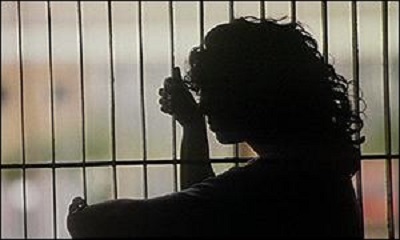 With all the recent press surrounding criminal justice issues—including President Obama’s record number of sentence commutations and his substantial piece in Harvard Law Review about the need to replace a policy of ongoing punishment with a policy of second chances—where is the mention of incarcerated mothers? Barriers that prevent women from raising their children from prison and upon their release are having a profound impact on many communities and the nation as a whole; removing them should be at the top of any criminal justice agenda. Yet the issue receives nary a mention.
With all the recent press surrounding criminal justice issues—including President Obama’s record number of sentence commutations and his substantial piece in Harvard Law Review about the need to replace a policy of ongoing punishment with a policy of second chances—where is the mention of incarcerated mothers? Barriers that prevent women from raising their children from prison and upon their release are having a profound impact on many communities and the nation as a whole; removing them should be at the top of any criminal justice agenda. Yet the issue receives nary a mention.
As a parent who was separated from my children through incarceration and as a social worker who now works with families in that situation, I know exactly how high the cards are stacked against incarcerated mothers. I also know the challenges these moms face are unique from those faced by their male counterparts. While much of the press surrounding mass incarceration focuses on males, female incarceration reverberates throughout the community on a different scale. When a father goes to prison, the disintegration of the family doesn’t tend to follow, because the mother is left behind to care for the children. She will often move heaven and earth to keep the father in her children’s lives and will make great sacrifices of time, money, and convenience to visit him in prison.
When mothers are incarcerated, there is no one to make such herculean efforts. For a variety of reasons, fathers are often not around to raise their children, much less take them to travel hundreds of miles to visit their incarcerated mothers (to say nothing of the stigma of having an incarcerated mother versus an incarcerated father). The children are often raised by a relative, or they enter foster care.
During an eighteen-month sentence when I was more than 50 miles from the city where I lived, my son went into foster care while my sister raised my daughters. And they didn’t visit me once.
I was hardly an isolated case. In 2004, approximately 59 percent of parents in a state correctional facility and 45 percent of parents in a federal one reported never having had a personal visit from their children. Yet studies show that maintaining positive ties between an incarcerated person and his or her family is strongly associated with reduced recidivism, and that regular visits help children heal.
Even after I was released from prison, the system continued to work against my right to parent my own children. The Administration for Children’s Services would not release my son from foster care until I met all of its requirements. Among them was that I had to have an apartment (but not public housing, from which I was barred from applying) and steady employment (though jobs are hard to come by when you have to check a box describing yourself as a felon, and you are prohibited from receiving financial aid to advance your education and improve your prospects, because you had to check the box on school applications too).
Thankfully, a lot of progress has happened since then, especially in my home state of New York. Formerly incarcerated people, and their allies, have fought for and won the right to live with their family members in public housing; they can attend college and receive financial aid; and while they still can be asked about a criminal record on a job application, they cannot be denied the position based solely on their answer. It has also been a year since Governor Cuomo signed legislation relating to the shackling of pregnant inmates. Other states should follow suit.
Through its commitment to comprehensive tele-conferencing programs, New York is about to be a model state in further eliminating barriers that prevent mothers from parenting their children. While tele-conferencing can never take the place of physical visits where children can speak with, see, and touch their parents in person, virtual visiting can be instrumental in maintaining relationships between children and their incarcerated mothers. Regular “visits” keep mothers in their children’s lives and facilitate an as-close-to-normal parent-child relationship as possible, in which mothers can counsel their children, set rules, help them with their homework, and talk about all the minutiae that make up a child’s daily life. The Child Center of NY is spearheading this program, called A Vision for Tele-Visiting, in partnership with the organizations Hour Children, Osborne Association, and York College. Importantly, the program also includes the mental health and wraparound support (like job placement and benefits counseling) that makes a successful reentry into community life much more likely.
In a country where the number of children with a mother in prison has risen 131 percent, it’s hard to see how this wouldn’t be an investment worth making—and how it wasn’t worth a mention in our President’s 56-page article on criminal justice reform.
Tina Reynolds, MSW
Project Director
A Vision for Tele-Visiting








I think this is an issue that has not been placed equally as important as men and prison reform. I would like to think that although women are specifically mention that they too are included. According to your study this is not the case; am I right. Are we asking for two separate reforms or joint? When men are sentenced to be away from their children, I think there is less of a concern about how the children are going to be raised because the weight has always fallen on the shoulders of the mother or grandmother or even the extended family member who is most likely going to be a women; am I right? I happen to also feel that the same services that are allotted for women regarding under the umbrella of prison reform should also be extended to the men. We both would like to raised the children equally while in prison unfortunately and afterwards.
Thanks for sharing this. I’m glad to see you included some questions that should be addressed when considering a lawyer. Oftentimes, clients are aware that there are questions to be asked, but with how complicated law can be for some people, it’s difficult to figure out what those questions actually are.